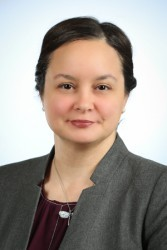Competency-Based Education: Q & A Update
It’s becoming a reality!
Thanks to grants and donor gifts, Competency-Based Education (CBE) is becoming a reality at MLC.
 Dr. Nichole LaGrow (pictured), director of the Nontraditional Education Program that leverages CBE, has been hard at work since January, putting the necessary pieces into place for the nontraditional elementary education degree. We asked her to give us an update.
Dr. Nichole LaGrow (pictured), director of the Nontraditional Education Program that leverages CBE, has been hard at work since January, putting the necessary pieces into place for the nontraditional elementary education degree. We asked her to give us an update.
The big question: When can we officially admit students?
We are still at least a year away from recruiting and admitting our first cohort of learners. We need to make our way through all the internal, on-campus curriculum review processes and meet all the state licensing and accreditation requirements. These are some of the things I’ll continue to work on this summer and next school year.
Some are wondering: Will this be an easy way to an elementary ed degree and a call?
We do not want to give anyone the impression that this is a quick backdoor way into the ministry. We are intentionally crafting a program that will hold the same academic rigor as our traditional program. So, in the fundamental ways, the nontraditional CBE program is similar to our traditional on-campus program. Yes, the outcomes are the same. A learner who engages with the CBE elementary education degree program will be tasked with achieving the same outcomes and meeting the same standards for licensure as our on-campus students. In many cases, we will use the same, or very similar, major assessments, which ask learners to create lesson plans or unit plans, critique case studies and scenarios, engage in self-reflection, or craft research papers and presentations.
Will the program include a student teaching experience too?
Yes, we are incorporating all the required clinical experiences in the program. The hours of observing, micro-teaching, and student teaching provide valuable opportunities to take those theories of teaching and learning included in the curriculum and apply them in the classroom.
Where will the student teaching take place?
We already have internal processes in place to help identify WELS and public schools in the learners’ communities that would be ideal sites. And learners may very well be able to complete the clinical experiences at Lutheran elementary schools where they are already serving as paraprofessionals or volunteers.
CBE sounds very similar to our on-campus elementary ed degree program. What makes it different?
The nontraditional CBE program is different in several ways:
- CBE is entirely online: Learners will not need to come to
New Ulm, though they are always welcome to visit—to meet
with me or engage with their professors. - CBE is self-paced and flexibly paced: Learners will
move through the course content differently and more
independently, completing comprehension checks and
assessments to demonstrate their knowledge and
competence. While we will encourage learners to complete
a minimum of 12 credits (about four courses) each term,
they will engage with each course one at a time, accelerating
where they have knowledge and experience to support their
learning, and taking time to deepen their knowledge when
content is new or needs to be refreshed. - CBE does not include gen-eds. The program will not
include the general education courses that all college
degrees require. Learners will need to complete those
courses at another college or university if they do not
already have a degree.
These are big differences. For those who could never enroll in a full-time on-campus experience here, these differences will make it possible for them to become licensed teachers.
Our program is not merely about producing licensed teachers, is it?
Producing licensed teachers is one goal, but not the only goal. MLC graduates are not merely state-licensed. They are also synod-certified. The CBE program, like our traditional program, is grounded in MLC’s mission “to train men and women to meet the public ministry needs of the WELS and to proclaim the Word of God faithfully and in accord with the Lutheran Confessions in the Book of Concord.” That means we are also building a CBE course of study in the required theology courses, which are imperative for shaping who we are as Lutheran educators. Learners will engage in the six-course theology minor first, before beginning their education coursework, to ensure that they have a strong foundation in the principles and practices of our shared faith.
How will MLC support the learners?
In addition to providing the academic content, we will assist and encourage the learners every step of the way. One specific support we will incorporate is the cohort model. The learners will enroll in cohorts—small groups that make their way through the program together. While learners in a cohort may not necessarily be working their way through the same courses at the same time, the cohort model creates a space where they do some things together. Cohorts will be invited to participate in monthly synchronous virtual meetings to learn more about the resources in the MLC Library, educative Teacher Performance Assessment (edTPA), and New Teacher Induction (NTI), to name just a few of the resources available to all members of the MLC community.
Even more important, cohort members can celebrate successes, share resources, engage in dialogue, and build a community across the WELS—a blessing our traditional students have through their engagement in campus life.
What are you most excited about right now?
I think that’s the hardest question you’ve asked me! There are so many blessings to celebrate. It is truly wonderful to be a part of a supportive community where we are all working together to achieve this shared goal. What brings me joy is knowing that each day we are one step closer to welcoming our first cohort of learners, and I cannot wait to share the content, activities, and assessments we are creating with them.
What Is Competency-Based Education?
And Why Do We Need It?
The need for more WELS teachers is great. Some of our schools—especially urban schools—have seen explosive growth. After the assignments were announced on MLC Call Day in May 2022, 140 teacher vacancies around the synod were unfilled. The challenge remains: After this year’s Call Day, 158 teacher vacancies were unfilled.
Our new nontraditional program will leverage Competency-Based Education, or CBE, to help fill this great need. CBE is an online option that recognizes competence in a subject or skill through activities, assessments, and portfolios. It is intended for those who already have a two- or four-year college degree, but do not have the academic credentials needed to become a state-licensed and synod-certified teacher. It is designed to reflect the same high standards as our traditional programs.
CBE will work especially well for second-career individuals and unique urban people groups, allowing them to earn their college degrees while staying in their own communities and their own jobs—some of which are in WELS schools.





